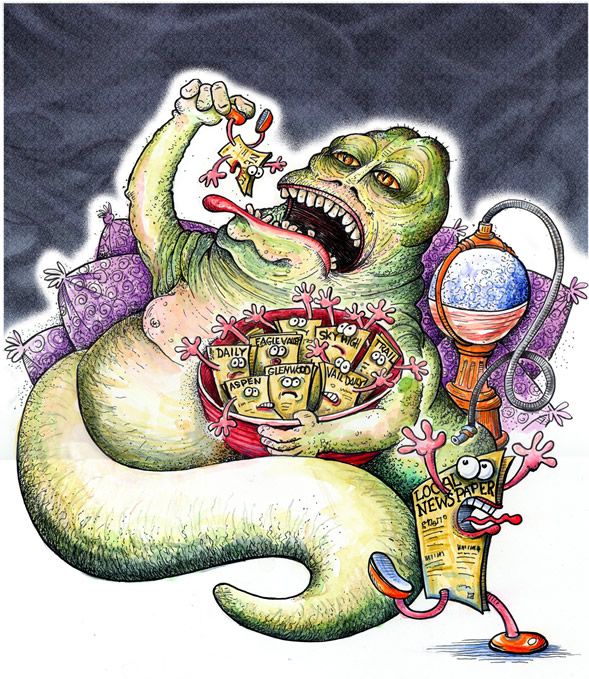Freelancers forgotten in battle against vulture-capitalist owners like Alden Global

This illustration by Don Sidle once ran with a story on the voracious acquisition of local media by California-based Swift Communications. Now it looks a lot like Alden Global Capital consuming the Denver Post and Boulder Daily Camera.
It’s been a brutal decade for freelance journalists. From a high-water mark of 2007, when I actually made a living wage, through the great recession that led to the death or disemboweling of so many publications, to the recent, dramatic rising up of what remains of the Denver Post editorial staff.Throughout it all, freelancers have become journalism’s untouchables.
Who cares when the publishing platforms themselves are threatened by the twin terrors of Internet ad/news saturation and vulture capitalists like Post-owner Alden Global Capital? Fair question, and I get too why salaried staffers at papers like the Post are loath to see cheap freelance labor with no benefits filling their ever-shrinking news hole.

The O. Zone
by David O. Williams
Thing is, most freelancers were once salaried staffers with benefits, cast aside by ownership for a myriad of reasons and desperately trying to cling to their chosen profession in a community they love. Those freelancers often have worked for decades in those communities and possess a wealth of institutional knowledge about who the players are and where the bodies are buried.
Newspaper chains, however, like to keep the revolving door spinning, bringing in young, unproven talent to learn the ropes on the cheap – and then have them move on to another paper just as they’re starting to figure out the stories behind the stories in their town or county.
Within the last year, I’ve worked for as little as $50 for a story in an unnamed mountain-town newspaper. Hardly worth the time it takes, but if I didn’t write it, the short-staffed publication would just ignore a key issue at a time when society can’t afford for issues to be ignored. And, after my story published, a salaried staffer picked up on the line of reporting and ran with it.
There are dozens if not hundreds of cast-off journalists like me in towns and counties across Colorado, lamenting the burned-out husks of their former newspapers, magazines and websites. We are a powerful and largely untapped resource that’s underemployed and desperate for a return to the glory days of freelancing, when budgets were fat and editors valued our work.
For the first time in my nearly 30 years of journalism in Colorado, I started this year by carving off a thin slice of my meager freelance earnings to pay $8.99 a month for a full-access digital subscription to The New York Times. I never paid because I live in a place with a highly successful free daily, and I always viewed subscriptions as one of the few perks of the job.
But the work The Times is doing right now is far too critical to ignore financially. The newspaper and its longtime family ownership is fighting to save our democracy, and they’re reinvesting any Trump-era windfall in a growing and ever-more influential editorial staff.
Also, just as critically to me, The Times is investing in community journalism by occasionally using freelancers such as myself on stories of vital importance that otherwise might not be told. It’s been a while, but I last worked for The Times with Pulitzer Prize-winning reporter Eric Lipton in 2014, and before that dating all the way back to the Kobe Bryant case in 2003 — with a variety of other stories sprinkled in between over the years.
I also used to regularly write for both the Denver Post and Rocky Mountain News, which went out of business in 2009, but the Post stopped buying freelance from me more than a decade ago. That’s one of the reasons I won’t be scrounging from my meager freelance funds to pay the Post $11.99 a month ($3 more than The Times?) for unlimited digital access.
The other reason is because the Post is not a family-owned newspaper that’s reinvesting in its community by funneling resources back into editorial. Instead, Alden Global Capital is reaping significant profits while slashing journalists at an alarming rate.
Reinstate the 30 journalists who just got cut and start adding reporters and editors to get back to 2009 levels and I might think about paying. Since the death of the Rocky, a combined 400 journalists at both papers has dwindled to a mere 70 at the Post. I’ll sign a one-year contract with Alden if they guarantee in writing an immediate return to 100 and a plan to get back to 200 soon.
Oh, and I’ll need a commitment to start buying quality freelance work from all corners of the state again – not just a content-sharing deal with local papers that hoses freelancers. I write it for the Vail Daily and it magically shows up in the Post for no added freelance fee, and I should be thrilled to see my work in a major-metro again (sans actual byline)? Screw that.
I’d rather give my local subscription money to Clarity Media and its two titles that I still write for occasionally — the Colorado Springs Gazette and Colorado Politics. Clarity is clearly ramping up and reinvesting in editorial in what many view as a bid to acquire the Post.
But a better scenario, in my opinion, than seeing conservative billionaire Clarity owner Phil Anschutz snap up the remnants of the Post is a new investor group shaming Alden into getting out of Coloradobefore we all pick up our metaphorical pitchforks and march on Adams County, or wherever it is that the vulture capitalists are holding the Post staffers hostage these days.
And if Swift’s Colorado Mountain News Media — a family operation that runs many of the mountain papers I still work for — puts up a paywall, I guess I’d have to consider ponying up for their digital product as well. I’ve had my independent newspaper wars with CMNM, but they’re still spending on editorial in underserved rural areas, although I’d obviously like to see more.
I want to see more reporting everywhere. Real content produced by real reporters who are then paid real money. The Internet can aggregate and fake it only so long before people figure out that journalists – like teachers – serve a vital function in a democratic society. And we deserve to be paid accordingly.
The ultimate irony of the recent uprising is that Post editorial page editor Chuck Plunkett started this year off singing the praises of the paywall, declaring in a headline, “We’re so over working for free.” Now he’s the hero of the story for risking his own neck calling out his vulture capitalist owners after the latest round of cuts – downsizing funded by gullible readers.
Well, Chuck, the public is so over getting fleeced, and freelancers (the word “free” is in the job title, after all) are so over working for damn-near free. Thanks for finally taking a stand on behalf of us all, and let’s collectively hope something good comes from the uprising — not just another story on the front page of The New York Times.
Editor’s note: April 16-22 marks the first-ever Colorado Journalism Week.


Latest posts by David O. Williams (see all)
- Democratization or ruination? A deep dive on impacts of multi-resort ski passes on ski towns - February 5, 2025
- Western Rail Coalition looks to revive passenger rail service on long-dormant line connecting Colorado mountain towns - January 22, 2025
- Colorado ski town looks to dig deep, diversify energy sources as climate change threat looms - January 10, 2025

You must be logged in to post a comment Login